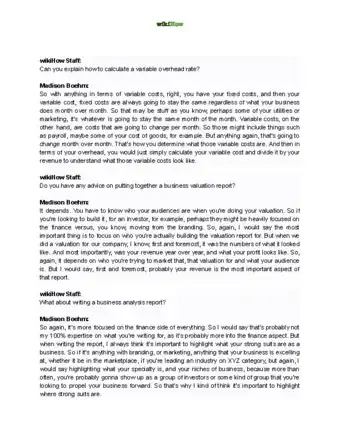This article was co-authored by Madison Boehm. Madison Boehm is a Business Advisor and the Co-Founder of Jaxson Maximus, a men’s salon and custom clothiers based in southern Florida. She specializes in business development, operations, and finance. Additionally, she has experience in the salon, clothing, and retail sectors. Madison holds a BBA in Entrepreneurship and Marketing from The University of Houston.
There are 8 references cited in this article, which can be found at the bottom of the page.
wikiHow marks an article as reader-approved once it receives enough positive feedback. This article has 23 testimonials from our readers, earning it our reader-approved status.
This article has been viewed 489,033 times.
Strategic planning involves outlining an organization's purpose, goals and the methods that will be used to accomplish those goals. As such, this plan is an integral part of an organization's functioning, and it is important that the task of developing the plan is approached with serious consideration and attention to detail. Follow these steps to write a strategic plan for an organization.
Steps
-
1
-
2Write a mission statement.[3] The purpose of your mission statement is to summarize your organization's underlying purpose, or vision. Strategic plans are extensions of the mission statement, as it is the mission statement that guides the goals and serves as a means of measuring an organization's success.[4] An example of a mission statement is, "It is our goal to be the nation's leading pet supply chain. We will accomplish this by researching, sourcing and providing for our customers the best available variety of low-cost, high-quality goods, and by exceeding customer service expectations in a way that will foster strong relationships with our customers."Advertisement
-
3Evaluate your organization's current standing. In order to plot out a course for reaching your goals, you must first understand where you are in the process of reaching those goals. Consider the following:
- Determine what your strengths and weaknesses are.[5] You will need to develop a strategic plan that makes use of your strengths in order to minimize your weaknesses.
- Identify opportunities for growth.[6] You may have a couple of investor offers on the table, or foresee an especially successful fundraising effort. Whatever your organization's purpose, you must be able to list viable opportunities for reaching your goals so that you can include in your strategic planning the means with which you will seize and make the most of those opportunities.
- Pinpoint threats to the success of your strategic plans. Threats may be in the form of an economic recession, an industry competitor or a change in government regulations. Your plan must address these threats and counter them with a viable strategy.
-
4List factors necessary to success. Strategic plans must include specifics about the types of circumstances that will lead to the accomplishment of goals.[7]
- Keep in mind 4 key focus areas when envisioning your objectives: financial goals, customer relations, operational methods and organization members.
- Citing the pet supply example, critical success factors might include things like relationships with quality pet supply distributors, a competent customer care team, a strong Internet presence providing round-the-clock services on a national level, state-of-the art accounting software and a research team devoted to finding the latest, greatest pet supplies.
-
5Develop a strategy for accomplishing each success factor. This should be in the form of a step-by-step plan, and should outline exactly what needs to be done, in what time frame, for how much of an investment and by which responsible party.[8]
-
6Prioritize your strategies according to viability and growth goals.[9] Taking into account all of the steps that are necessary to achieving each of your goals, as well as the order of importance in reaching those goals, itemize your strategic plan chronologically. For example, your goal of running your own fleet of trucks for delivery purposes may be considered a long term goal, as it will be very costly and you already have a temporary plan in place via shipment through third party entities; therefore, you may prioritize more urgent goals higher on the list.
Sample Communications Strategies
Community Q&A
-
QuestionHow do would I promote a campaign plan?
 Community AnswerYou can advertise your party/organization through the media with tv or radio commercials, or use more grassroots tactics like passing out pamphlets, organizing speeches and protests, sending out mailers, etc.
Community AnswerYou can advertise your party/organization through the media with tv or radio commercials, or use more grassroots tactics like passing out pamphlets, organizing speeches and protests, sending out mailers, etc.
Expert Interview

Thanks for reading our article! If you'd like to learn more about writing strategic plans, check out our in-depth interview with Madison Boehm.
References
- ↑ https://www.psychologytoday.com/us/blog/smartwork/201004/vision-and-mission
- ↑ https://www.businessnewsdaily.com/3882-vision-statement.html
- ↑ https://www.psychologytoday.com/us/blog/smartwork/201004/vision-and-mission
- ↑ https://www.entrepreneur.com/article/240085
- ↑ https://articles.bplans.com/how-to-identify-your-strengths-and-weaknesses/
- ↑ https://www.inc.com/ilan-mochari/edge-strategy-profitable-growth-alan-lewis-dan-mckone-lek-consulting.html
- ↑ https://www.entrepreneur.com/article/305688
- ↑ https://www.entrepreneur.com/article/284783
- ↑ https://hbr.org/2016/12/how-to-prioritize-your-companys-projects






































































